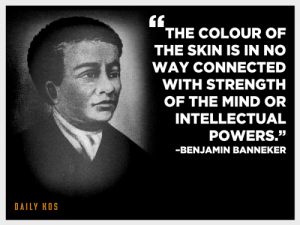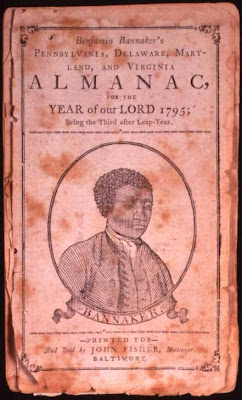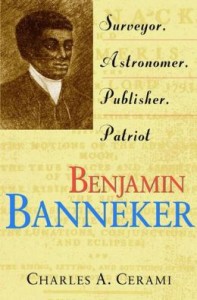A Black Intellectual Writes to Thomas Jefferson: Benjamin Banneker
Author: Bobby Valentine | Filed under: American Empire, Benjamin Banneker, Black History, Contemporary Ethics, Culture, Kingdom, Race Relations, Reading, SlaveryOn July 4, 1776 explosive words from Thomas Jefferson captured the hearts of men and women, white and black, in the British Colonies in America. Those words read,
“We hold these truths to be self-evident, that all men are created equal, that they are endowed by their Creator with certain unalienable rights, that among them are life, liberty and the pursuit of happiness.”
These words set the world ablaze, not only with war but with a new way of looking at humanity. The “Age of Liberty” though was not exactly as it appeared to be.
Following the Revolutionary War, from 1783-1800, many of the Patriots lead a full blown retreat from the implications of the famous words above. The seventeen years following the war have been termed by the provocative work by Larry Tise as “the American Counter-Revolution.” In fact Thomas Jefferson, who always retained the rhetoric of the pursuit of individual rights is deemed as “the most radical counterrevolutionary” of them all [1]!
Jefferson had published, in 1785, his Notes on Virginia that attained near canonical status among slave holding Americans. When Jefferson won the most contentious election in American history, it was because of the “federal ratio” – that is the Three-Fifths Clause in the Constitution giving southern slave states a greater number votes in the Electoral College (Jefferson lost the popular vote). Future president John Quincy Adams wrote of the election of Jefferson, “The election of Mr. Jefferson to the presidency was, upon sectional feelings, the triumph of the South over the North – of the slave representation over the purely free” [2].
The Notes changed the way Americans thought and talked about liberty, freedom, equality and the rights of humans. Now, even with the Revolution fresh in mind, there was no vision that could bind all humans together within the United States. For Thomas Jefferson, blacks were constitutionally inferior, morally bankrupt, and unfit for social equality with whites. They may be good for sexual exploitation however [3].
Thomas Jefferson’s new doctrine reads rather clearly in his Notes,
“I advance it therefore as a suspicion only, that the blacks, whether originally a distinct race, or made distinct by time and circumstances, are inferior to the whites in the endowments both of the body and mind.”
Liberty was colored even for the writer of the Declaration of Independence.
A “Black” Enlightenment
Though Thomas Jefferson did not believe his own words, they inspired folks on the other side of the colored liberty line. The period following the Revolutionary War saw a “Black Enlightenment” with African Americans breaking out of the stifling limits, imposed by bigotry, in significant ways. Phillis Wheatley dazzled white readers with her poetry. Olaudah Equiano became a world traveler and a crusader for black liberty. One man who emerged from the shadows was Benjamin Banneker.
By 1791 Banneker had become a well known celebrity of sorts. Banneker was a free black tobacco farmer in Maryland. He was, in many ways, the counter part of his white name sake Benjamin Franklin. Both were born and raised in destitution. Both were self-taught. Both loved mathematical puzzles. Both were fascinated by nature, patterns of weather, and astronomy. Both enjoyed the challenge of creating almanacs. Both, it would seem, were products of the Age of Enlightenment. Banneker’s first almanac was rejected because the publisher did not believe a black man was capable of performing the mathematics required for one. Yet when his almanac was published that it said it was a “COMPLETE and ACCURATE EPHEMERIS for the year 1792” and had been
“calculated by a Sable Descendant of Africa, who, by this Specimen of Ingenuity, evinces, to Demonstration, that mental Powers and Endowments are not the exclusive Excellence of white People, but that they Rays of Science may alike illumine the Minds of Men of every Clime, (however they may differ in the Colour of the Skin) particularly those whom Tyrant-Custom hath too long taught us to depreciated as a Race inferior in intellectual Capacity.”
In other words, black men were not mere brutish beasts. Further in 1791 Banneker had been engaged by President George Washington as one of the surveyors and planners for the soon to be capital of the United States. Banneker, a true son of the Enlightenment, was a man who believed that liberty came for those of a different color too. Thomas Jefferson did pass on the Almanac to the Academy of Sciences in Paris as possible evidence that some blacks were capable of science.
A Black Intellectual Writes Thomas Jefferson
On August 19, 1791 a sixty year old Benjamin Banneker sat down to write a short note to then Secretary of State Thomas Jefferson. As Banneker explains at the end of the letter he initially intended to only send Mr. Jefferson a copy of his almanac so he could peruse the contents.
But something moved Banneker to express himself to the supposed Apostle of Human Liberty on the matter of liberty for black people within the United States. It is not without irony in the shadow of Jefferson’s Notes that Thomas’ Paine’s The Right’s of Man was published in May of 1791 just a few months prior to Banneker’s letter. Paine’s book was endorsed by Thomas Jefferson. But what did the black intellectual say to the author of the Declaration of Independence and Notes on Virginia? He opens
“Sir: – I am fully sensible of the greatness of that freedom, which I take with you on the present occasion {Banneker it will be recalled was a free black man}, a liberty which seemed to me scarcely allowable, when I reflected on that distinguished and dignified station in which you stand, and the almost general prejudice and prepossession which is so prevalent in the world against those of my complexion.”
Banneker mentions how common the notion is that blacks are mere brutes …
“I suppose it is a truth too well attested to you, to need a proof here, that we are a race of beings who have long laboured [sic] under the abuse and censure of the world, that we have long been considered rather as brutish than human, and scarcely capable of mental endowments.”
But Banneker submits his almanac as proof of the mental endowments and human qualities of his race. He tells Jefferson that “we are all of the same family, and stand in the same relation to him [i.e the universal Father].” Banneker likewise appeals to the “obligations of christianity” [sic]. It is because blacks and whites are part of the same family and “christian” obligation that Jefferson should pursue liberty for all men regardless of color. He appeals directly to the Revolutionary heritage in his letter to Jefferson. Surely the men of 1776 were no hypocrites.
“Sir, I have long been convinced that if your love for yourselves and for those inestimable laws, which preserve to you the rights of human nature, was found on sincerity, you could not but be solicitous that every individual thereof, neither could you rest satisfied, short of the most active diffusion of your exertions in order to their promotions from any state of degradation to which the unjustifiable cruelty and barbarism of men have reduced them.
Sir, I freely and cheerfully acknowledge that I am of the African race, and in that colour which is natural to them of the deepest dye, and it is under a sense of the most profound gratitude to the Supreme Being of the universe that I now confess to you that I am not under that state of tyrannical thraldom and inhuman capacity to which to many of my brethren are doomed ...”
Banneker reminds Jefferson of the “powerful effort” of the “British Crown” to reduce the colonists to a “State of Servitude.” At that time Jefferson “clearly saw into the injustice of a state of slavery.” So clearly did he see that injustice Banneker, ironically, quotes back to Jefferson those nearly immortal words that filled so many oppressed with a sense of hope.
“We hold these truths to be self-evident, that all men are created equal, and that they are endowed by their creator [sic] with certain unalienable rights, that among these are life, liberty and the pursuit of happiness.”
Banneker confesses his dismay at how any person could say those words, much less write them, and justify the existence of slavery and the racism required for the peculiar institution to survive in the atmosphere of the post-Revolutionary War. Banneker forthrightly points out Jefferson’s hypocrisy witnessed in his Notes and in his own possession of slaves.
“Here, sir, was a time in which your tender feelings for yourselves had engaged you thus to declare, you were then impressed with proper ideas of the great valuation of liberty and the free possession of those blessings to which you were entitled by nature; but sir, how pitiable is it to reflect that although you were so fully convinced of the benevolence of the Father of mankind and of his equal and impartial distribution of those rights and privileges which he had conferred upon them, that you should at the same time counteract his mercies in detaining by fraud and violence so numerous a part of my brethren under groaning captivity and cruel oppression, that you should at that same time be found guilty of that most criminal act which you professedly detested in others with respect to yourselves.”
The black intellectual pleads with Jefferson to become empathetic with black slaves. Appealing to the words of a lamenting Job, the black scholar exhorts Jefferson to “put your soul in their souls stead.” Thomas Jefferson did not and could not ever do that.
Adding Benjamin Banneker to the “Canon”
The letter of Benjamin Banneker to Thomas Jefferson on August 19, 1791 was laden with potential to renew the promise of the American Revolution. Banneker knew that Jefferson symbolically stood at the head of the revolution but also sadly was the man who derailed it. Jefferson went on to become President of the United States on the back of slaves who were not even recognized as a full human and denied even three-fifths representation and his Notes became the water hydrant to quench the fervor for rights for all Americans. The Declaration of Independence was often explicitly rejected while the Notes became near scripture especially in the South.
Banneker, an elderly self-educated genius saw through Jefferson and called Jefferson’s bluff. This man can serve as a model of what we can be, every bit as his white counterpart Benjamin Franklin. He did not let his circumstances define him. He had limited “formal” schooling but was a life long disciple in the best sense of the word. He disciplined himself daily and nightly in the path of knowledge rather than property or wealth. His physical travels were very limited but his mind traveled the entire Creation of God. He broke through the stereotype that black men were ignorant sexual brutes (ironic in light of Jefferson’s years long raping of Sally Hemmings). He even shows that “elderly” people are not over the hill with nothing to accomplish or contribute –

Thomas Jefferson was in a unique position to have “ears to hear” with Banneker. May God enable us to see beyond our ancestors.
after all he did not publish his first almanac until he was nearly 60 years of age.
Facing systemic bigotry on a daily basis he overcame by the power of his God-given, and cultivated, intellect.
When I read the story of Banneker I am reminded of the startling quote Thomas Chatterton Williams attributes to his father regarding basketball,
“If you’re going to compete then do your best, son, always do your best, but remember that I really don’t care if we ever have another black athlete or entertainer” [4].
The problem is not athletes nor entertainers but the racist stereotype that pigeon hole African-American males in those roles … they do not define “blackness.” Banneker destroys that image and can show both white folks who still retain a “subtler” form of Jefferson’s blatant racism and at the same time inspire a generation of new intellectuals. Both black and white. He is worthy of emulation.
Perhaps Banneker deserves to be in the Canon of American Saints as much – perhaps more – than Thomas Jefferson. The more I think about it I think Tise was correct, Jefferson was the most radical counter revolutionary.
Perhaps you do not know much about the great American hero Benjamen Banneker. If not let me recommend the excellent study by Robert Silverstein and Charles Cerami, (link) Benjamen Banneker: Surveyor, Astronomer, Publisher, Patriot (Wiley, 2002). You will be blessed.
Notes:
1] Larry E. Tise, The American Counter Revolution: A Retreat from Liberty, 1783-1800 (Stackpole Books, 1998), 439-451.
2] The only book length study on the role of the “Three-Fifths” clause in Jefferson’s election is the marvelous work by Garry Wills, “Negro President”: Jefferson and the Slave Power (Houghton Mifflin Company, 2003). Quote from p. 1.
3] See Jan Ellen Lewis & Peter S. Onuf, eds, Sally Hemings and Thomas Jefferson: History, Memory and Civic Culture (University of Virginia Press, 1999).
4] Thomas Chatterton Williams, Losing My Cool: How A Father’s Love and 15, 000 Books Beat Hip-Hop Culture (Penguin Press, 2010), 34-35. Emphasis in original.



November 20th, 2012 at 8:36 am
Fascinating. I have been thinking a lot about liberty and personal freedoms lately myself, with the outcome of this Presidential election. The ever-widening divides that I see in our country now-a-days do seem to be polarizing our nation to an extent much like the issue of slavery back in the early days of our nation’s founding. It almost seems to me that our nation has gone full circle w.r.t. “freedom” and “liberty.” During the revolutionary and civil war eras individual freedom was the ultimate goal and many were willing to sacrifice their lives in an effort to secure their right to “unalienable Rights, that among these are Life, Liberty and the pursuit of Happiness.” –Declaration of Independence. But it seems that in our modern world, people in the United States have absolutely no problem with willingly giving up many of their hard-won freedoms in order to get “free-stuff” from the government. It’s like there is this huge disconnect with our country’s rich history and where we came from. I have to wonder if our education system is failing our children and young adults in this respect? John Stossel took a camera to the celebration rally for President Obama, in Chicago, on election night. He asked several people of varying ages, gender and race: “So what does President Obama’s win tonight mean for freedom [in America]?” And not one single person asked had an answer. Some were just completely dumbstruck and speechless. Others said “Ummmm, I don’t?”, with a pained and puzzled look upon their face. Clearly, few if any had even stopped to consider the implications of their voting choice upon the very principle that our nation was founded. That just boggles my mind?! … Anyhow, great post here. Most imformnative and thought provoking. I will definitely take a look into the sources you recommend. Thank you for sharing. Nice to meet another American who still values our country’s rich history and enjoys exploring where we came from so that we can move forward with wisdom and insight toward a hopefully brighter future for our (once?) proud nation.
February 5th, 2015 at 7:53 pm
Isn’t it strange that out universities were built to train preacher. They were heavily endowed by persons for teaching theology. All of those Ivy League schools, whose purpose was to teach the Word of God, now does not want to let God, Jesus, or the Holy Spirit, in the doors. Yale was started by Bible proclaiming Christians. Harvard & Yale(orriginally Puritan, Princeton- Presbyterian. Yale was named after a christian minister Rev.Dickinson, crest in Latin trans Under God she flourishes, Oxford university in the UK by Celtic preacher, Cambridge U. Est 1209 by christian Leaders, university of Edinburgh, Presbyterian, Pepperdine University in Malibu, founded by the churches of Christ. II Timothy 4:3-4 The man who donated the property died a pauper. He started the Western Auto Store which later went bankrupt. But that was it’s beginnings
April 5th, 2018 at 12:29 pm
I agree with Allison. Many of the early universites were built and funded to teach men the arts of preach God’s Word.